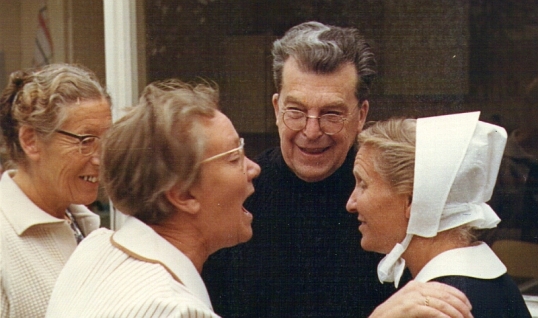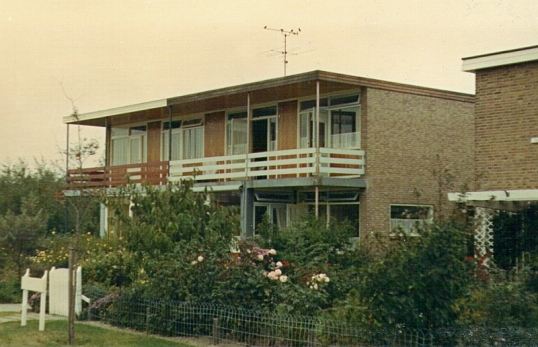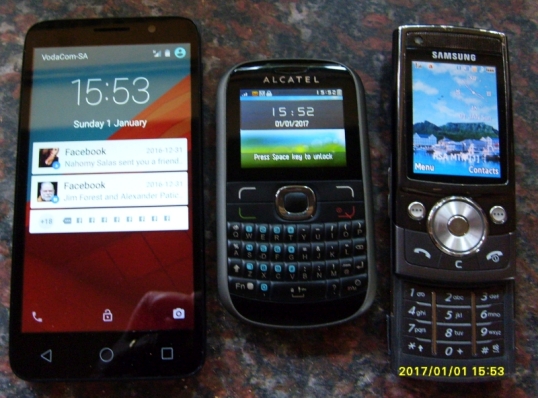Fifty years ago I had a kind of gap week between working and going to college. I had finished my job with London Transport, and Brother Roger, an Anglican monk of the Community of the Resurrection (CR), invited me to join him in a visit to a couple of middle-aged Dutch ladies who had invited him to stay with them.
They stayed in Bergen, North Holland, and their names were Wieta Monquil and Ank Schoen. Their backyard had a couple of self-catering flats which they let to summer visitors, but summer was now almost over, and the last visitors were some German deaconesses, with a couple of their elderly relatives.

Wieta Monquil, Ank Schoen, Brother Roger, CR, and one of the German Deaconesses. Bergen N-H, September 1966
Brother Roger said that he had met Ank and Wieta quite by chance. He had been with another CR Brother, Brother Zach, who was from Bermuda, and they had got chatting in a park. And that had led to the present invitation.

Dieudonne, the home of Wieta Monquil and Ank Schoen in Bergen, North Holland
On Sunday we went to church with Ank and Wieta, to a small Dutch Reformed Church in a country village some distance away.

Church in a small village somewhere in North Holland
The church building was very old and square in shape. The pulpit was very high, and in front of it was a brass windmill, forming the top of an arch over the rail around the pulpit. The dominee was very young, but preached rather well, and spoke quite slowly, so I could understand most of what he said. All the children sat on the left, and four of them were given presents, as they were now 11 years old and would be leaving the Sunday School.
After church Brother Roger and I rode into the village on bicycles and looked at an old railway locomotive there, which had once pulled trains between Alkmaar and Bergen-on-Sea, but the line had long since been abandoned. Around the town there were lots of children on bicycles, most of them very rude, and giving hostile looks at us. They didn’t seem to like foreigners.
In the afternoon two friends of Ank and Wieta, Peter de Kleer and Evert van Kuik, who lived in a nearby town, came to lunch, and then we went with them and two of the German deaconeses to see the Afsluitdijk between the Ijsselmeer and the North Sea. We crossed over miles of flat country that had once been twenty feet below sea level, and was land reclaimed from the old Zuiderzee. Evert said it had been flooded by the Germans at the end of the war. We rode along the dijk to the middle, where there was a monument to mark the spot where it had finally been closed, at the 12th attempt. We climbed the tower that stood there, and looked out over the grey expanse of the North Sea, and over to the north-east was Friesland, and to the south-west was West Friesland, from which we had come, though really it was part of North Holland. Down below someone was fishing in the Ijsselmeer, and there were gulls swimming and flying around the nets.

Afsluitdijk, separating the North Sea from the Ijsselmeer.
We went back in the car to the island of Weeringen, which was now no longer an island, having been surrounded by polders long ago. We went to the town of Den Oewer, and an old man on a bicycle showed us the way to a house where Crown Prince Wilhelm, son of the last German Emperor, had lived. I found that I could understand what the old man was talking about far more easily than I could understand Ank or Wieta. I found their accent very difficult to follow, and when I talked to them in Afrikaans they would say “Dat is leuk!” (That’s so cute). The old man said the Kaiser’s son’s old house was now the dominee’s house. The church there was also a very old thing (according to him). We then went on, passing many houses with their roofs made of tiles, and with the tiles partly thatched over. Peter said that the Dutch called any single-storeyed house a “bungalow” — which accounts for some confusion when I had asked the way to places, for we only used the words to describe barrack-huts and things like that.
After that we went back home, and had a big and jolly supper time with the German Deaconesses and their mother, which was really like a Tower of Babel, because so many languages were being spoken.

Brother Roger cycling from Bergen to Alkmaar, 27 September 1966
Ank went to work during the week and Wieta stayed home and looked after the house and the guests, not that they needed much. She was the nervous and talkative one, and was worried that she worried so much and could not be gentle and calm and patient like Ank.
On Tuesday 27 September 1966, fifty years ago today, Brother Roger and I went into Alkmaar on the bicycles. It was again a rather dull day, but the town of Alkmaar made up for any dullness in the weather. We went to look at the church, an enormous Gothic affair, and to get inside one had to go round to the office and pay 25c. That we did, and they gave us a guide leaflet, only when we got inside we found it was written in German, so we went and asked for another one, and Brother Roger explained that he was English and I was South African, and then said “Thank you” in French. “We are very international, aren’t we?” observed the girl who gave it to us, and when we were back inside the church Brother Roger said they seemed much more pleasant and friendly when they knew we weren’t German.

Organ in the church at Alkmaar.
It seemed that there were lots of German visitors in this area in the summer, and some of them were old soldiers who come to show their families where they were during the war.
The church was built before the Reformation, between 1470 and 1520, but was now the Nederlands Hervormde Kerk, and the pulpit was halfway down the nave. At the end, in what had once been the sanctuary, were thrones for the 24 elders. The organ was a beautiful rococco thing, and the transept arches, built in bricks, were also very beautiful. When we left the girl at the door also mixed up her languages, as Brother Roger did sometimes as well. She finally said “Auf wiedersehen” as we were leaving, and I said “Totsiens” to her. I think the general sentiment was clear, however.
We then rode off down Lange Straat, a busy main street, and were almost run over many times, and turned off, and eventually we came out into the Waag-plein, where the cheese sales were held. There we went into a cafe, the Cafe de Waag, and had lunch. The lunch was soup with meatballs in, and lemon gin, and cheese and bread. The tables, as in all Dutch cafes, were covered with carpets, and there were two billiard tables, without pockets, and a kaaskop with glasses and a serious expression was practising while we ate. The object seemed to be to hit one ball so that it hit two others, but he never seemed to manage it.

Cafe de Waag in Alkmaar. 27 September 1966
After lunch we crossed the square and rode down a couple of narrow streets, and came to one with a house, or rather several houses, built onto a canal, one of which, with a lot of cheap trinkets in the windows, was described as “Huis met de Kogel 16e eeuw; gotische houten gevel (met kanonskogel uit het beleg van Alkmaar, 1573)” We rode alongside the canal, and a little further along saw a swingbridge open to let a boat through, and then a man walked out of the front door of his house, with a fishing net in his hands, dipped it into the canal, and walked back to his house with a bucket full of fish. The road we were on ended on the Noord-Hollandse Kanal, and we turned right, and went up Verdronkenoord, a similar street to the last one, with a canal down the middle, and beautiful old houses on each side.

Alkmaar, Noord-Holland
We went along the Oude Gracht, which had been pumped dry while canal and road were being repaired. The road menders gave us a friendly greeting, and said something about a “joy ride”. A friendly greeting is somewhat rare. Most of the natives of the country seemed to be hostile to foreigners, perhaps, as Brother Roger said, because they thought we were German, though a little further on, when passing through a park, we heard an old man telling two youngsters that we were Russian.
The following day we visited a Benedictine monastery at Egmond, and Fr Hoff, the sacristan, showed us some of the vestments which they sold there. Brother Roger bought a set of white ones, which was very beautiful, and cost fl190.00, about R38.00, which he said was cheap. We had a look at the chapel, which
was austere, and almost bare of any ornament, and then walked back to wait for the bus, up an avenue lined with chestnut trees, with the leaves all yellow and brown, so it really was autumn now.
After getting back to Bergen we cycled in to the town and had a look at a bookshop there, which was very good for such a small town. I bought a copy of Wachtend op Godot. It was actually the complete plays of Samuel Beckett. We had a drink at a cafe, with tables covered with the inevitable carpets. Brother Roger said that the Dutch, unlike the English, tended to look down on that. The English, being sociable, would go down to the pub for a drink, but the Dutch, or at least the respectable ones, would drink at home, with the curtains open, of course. But I rather liked the atmosphere of the Dutch cafes, with their carpet-covered tables, and they seemed much more quiet and respectable than an English pub.
After supper we said Evensong together, for the Eve of St Michael and all Angels, and I told Brother Roger about my theology of angels, and he did not agree with it. Then Wieta came along, and we read the Bible with her, the Psalms for Compline.
We also cycled to Kamperduin, on the coast, through pine trees and over the dunes. I believe that Camperdown in KZN was named after it.

Cycling to Kamperduin
For Michaelmas we went to Mass at the local Roman Catholic Church, and had supper with the priest. He said he had been an Anglican until four years ago, and had been a curate in Australia when he “poped”, as he put it. He had been trained at Kelham, spoke five languages, and was the youngest parish priest in Holland. He had a European parish, and had services in Dutch, French and German every Sunday. He had an interesting coffee-table book on the German occupation in the war. One chapter dealt with a strike and protest against persecution of the Jews, and in it was a reproduction of a document as follows” “Noot voor de redacties. Noot no 265. Niet voor publikatie. Amsterdam, 25 Februarie – Over stakinen t Amsterdam en over den algemeen toestand in deze stad mag niets worden gepublicieerd. Hoofredaktie. ANP. Niet voor publicatie.” Amsterdam in 1942, but it could just as easily have been Johannesburg or Salisbury in 1966.
That evening Peter and Evert came again, and we sat with the German deaconesses, and came, and we sat with the German deaconesses and talked. Brother Roger told us how he went home to England for a holiday once, and the superior asked him where he wanted to go, and he said to the Civil War in Spain, and so he did, with a group of Quakers to look after children. And in the town where he was a convent was suspected of harbouring traitors, so the Republicans blew it up, and the neighbouring church as well. But when they went into the church to blow it up they took off their caps and put out their cigarettes. There was also in the church at that time a statue of St James, reputed to work miracles, and they held a revolver to the head of the statue and said, “If you work a miracle tonight, we’ll blow your brains out.” — and that was said in all seriousness.
Before we went to bed I read Wieta an Afrikaans poem which she had, “Die vlakte”, by Celliers, and it delighted her. She said Afrikaans sounds so innocent and earthy. It is one of my favourite poems, apparently inspired by Shelley’s “Ode to the west Wind”, but much better than Shelley.
I went back to the UK, and began my studies at St Chad’s College, Durham, but in April 1967 my mother and a friend came for a holiday, and we hired a car in Amsterdam and toured round Europe, and on our return spent more time with Wieta Monquil and Ank Schoen. And I again spent a few days with them on my way home to South Africa in 1968. So they had become good friends.
As for Brother Roger, that was the longest time I had spent with him. He was my spiritual father, my guru, in many ways, and not just in theology. When I was 19 years old he plied me with books to read from the Community’s library in Rosettenville, and so was a kind of mentor in English literature as well. He turned me on to Samuel Beckett, Jack Kerouac, Charles Williams and many other authors, and talking to him seemed to me far more interesting and useful than three years of English study at university (I passed English I 3 times at two different universities, and none of them made literature seem as interesting and exciting as Brother Roger did).
.
 I also posted “then and now” photos in a photo album on Facebook, but one cannot tell much from responses to those because most people responded to the album itself rather than those particular pictures.
I also posted “then and now” photos in a photo album on Facebook, but one cannot tell much from responses to those because most people responded to the album itself rather than those particular pictures.


























